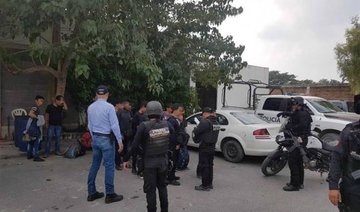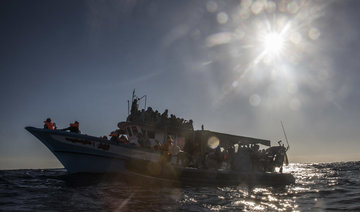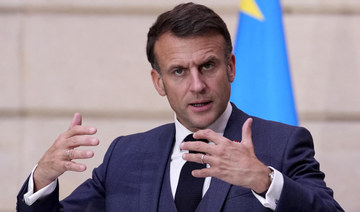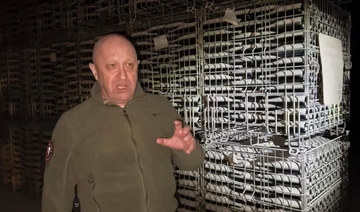MADRID: Moroccan rescue services have recovered the bodies of around 20 migrants in the Mediterranean, a spokeswoman for the Spanish enclave of Melilla said Sunday.
The bodies of the migrants, from sub-Saharan Africa, were spotted Saturday by a Spanish ship, which alerted the rescue services of both countries, the spokeswoman said.
She added that “about 20” bodies were then recovered in Moroccan territorial waters. Moroccan authorities have yet to issue a figure.
Late Saturday, a Spanish police patrol boat found one more body, which was taken to Melilla, a Spanish enclave bordering Morocco.
Migrants are increasingly favoring the so-called western Mediterranean route to reach Europe, which involves making the sea crossing between north Africa and southern mainland Spain.
According to the International Organization for Migration (IOM), Spain has been the second most popular point of entry for migrants coming to Europe so far this year, with 1,279 arrivals, after Italy with 4,256.
It said 243 people have died or are missing in the Mediterranean after trying to cross the Mediterranean this year, not including those recovered this weekend.
Spain was last year the third point of entry for Europe-bound migrants, after Italy and Greece. Arrivals by sea tripled in 2017 compared to the previous year, reaching a total of 22,900 migrants, according to the EU border agency Frontex.
Bodies of around 20 migrants recovered from sea
Bodies of around 20 migrants recovered from sea
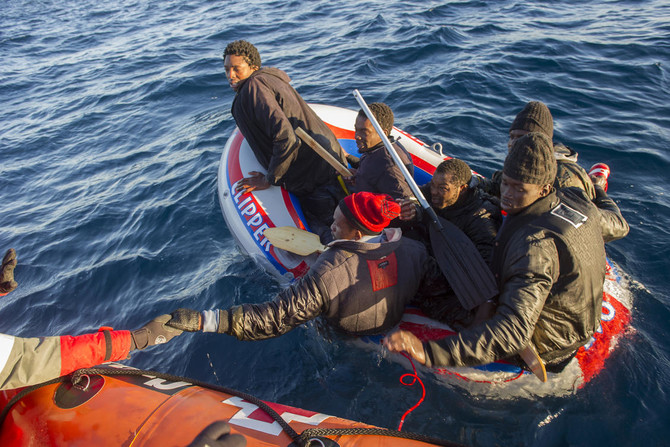
Pakistan’s first lunar satellite ICUBE-Q successfully enters moon’s orbit
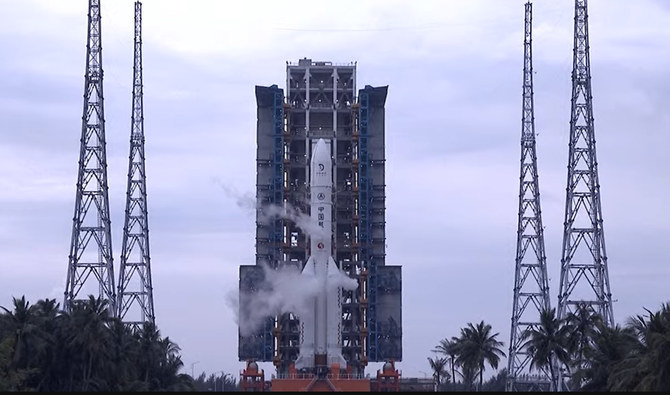
- ICUBE-Q was deployed in moon’s orbit around 1:14 p.m. Pakistan Standard Time, says Institute of Space technology official
- IST official describes development as “important” one for Pakistan allowing it to conduct “bigger” space missions in future
Islamabad: Pakistan’s first lunar satellite ICUBE-Q entered the moon’s orbit successfully today, Wednesday, a senior official of the country’s Institute of Space Technology (IST) confirmed, saying the “important” development could pave the way for “bigger” space missions for the country in the future.
The ICUBE-Qamar satellite carries two optical cameras to image the lunar surface and weighs around 7kg. Cubesats are tiny box-shaped satellites that are mainly launched into low Earth orbit to observe the Earth, test new communications technology, or perform miniature experiments.
Pakistan’s first lunar satellite was launched aboard China’s Chang’e-6 probe on May 3. The Chinese probe is tasked with landing on the far side of the moon, which perpetually faces away from the Earth, after which it will retrieve and return samples. China is the first country to make such an ambitious attempt.
“Our ICUBE-Q was deployed successfully in its orbit at 1:14 p.m. Pakistan Standard Time,” Dr. Khurram Khurshid, the head of the electrical engineering and computer science department at IST and a co-lead on the satellite project, told Arab News.
Dr. Khurshid said Pakistani officials will continue to test the satellite’s system for the next three to four days. He said initial tests revealed there were no complications with the cubesat’s system.
The IST official said the development means Pakistan is officially in an exclusive club of countries that have conducted deep space missions.
“This is the first step, a step in the right direction,” Dr. Khurshid noted. “It can lead to bigger space missions, such as landing on the moon or various other experiments.”
Dr. Khurshid said Pakistan would be able to share images from the satellite by May 15.
Around 100 students from IST contributed to developing the satellite. Pakistan’s proposal to build the satellite was accepted by the China National Space Agency (CNSA) from plans submitted by eight member states of the Asia-Pacific Space Cooperation Organization (APSCO).
The design, development, and qualification of the ICUBE-Q satellite were spearheaded by faculty members and students of the IST in collaboration with China’s Shanghai Jiao Tong University (SJTU), with support from Pakistan’s National Space Agency, SUPARCO.
The ICUBE-Q has two cameras as payload for taking images of the lunar surface that will be transmitted back to Earth for analysis.
UK says to expel Russian defense attache as ‘undeclared military intelligence officer’
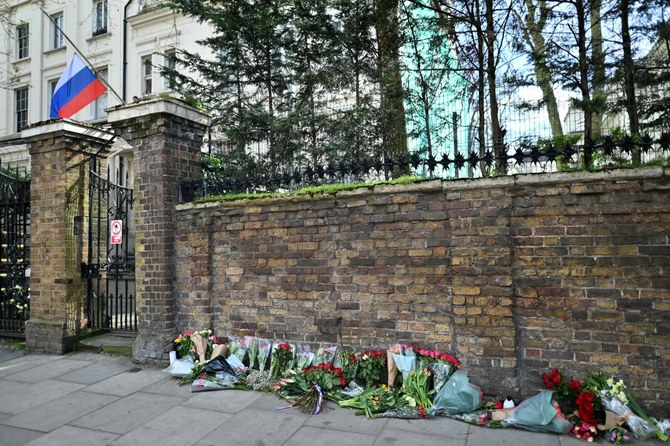
- Interior minister James Cleverly told parliament the UK would also remove the diplomatic status of several Russian-owned properties
- UK is currently a staunch NATO backer of Ukraine
London: The UK government on Wednesday raised tensions with the Kremlin by announcing it would expel a Russian defense attache for being “an undeclared military intelligence officer.”
Interior minister James Cleverly told parliament the UK would also remove the diplomatic status of several Russian-owned properties, including one in Sussex, southern England, and another in London “which we believe have been used for intelligence purposes.”
There would also be new restrictions on Russian diplomatic visas such as a cap on the length of time Russian diplomats can spend in the UK, he added.
The move comes with the UK concerned at an apparent increase in “malign” Russian activity on UK soil, including an arson attack on a Ukrainian-linked business allegedly orchestrated by the Kremlin.
A British man who it is claimed has links to the Wagner Group was charged in connection with that case last month.
London has previously accused Moscow of being behind the poisoning of two Russian former agents on UK soil, and of a spate of cyberattacks and disinformation campaigns.
The UK is currently a staunch NATO backer of Ukraine, providing training for troops and military equipment in the fightback against Russia.
Cleverly said the new package of measures was intended “to make clear to Russia that we will not tolerate such apparent escalations.”
He warned that Moscow would make accusations of Russophobia and spread conspiracy theories in response to his announcement.
“This is not new and the British people and the British Government will not fall for it, and will not be taken for fools by (President Vladimir) Putin’s bots, trolls and lackeys.
“Russia’s explanation was totally inadequate. Our response will be resolute and firm.
“Our message to Russia is clear: stop this illegal war, withdraw your troops from Ukraine, cease this malign activity.”
Taliban deny Pakistani claims of Afghan involvement in attack on Chinese workers

- According to Islamabad, bombing that killed five Chinese in Pakistan was planned in Afghanistan
- Afghan defense ministry says the March attack showed weakness of Pakistan’s security agencies
KABUL: The Taliban rejected on Wednesday allegations of Afghan involvement in a recent deadly attack on Chinese workers in neighboring Pakistan.
The five Chinese nationals, who were employed on the site of a hydropower project in Dasu in northwestern Khyber Pakhtunkhwa province bordering Afghanistan, were killed alongside their driver in a suicide blast on March 26.
Pakistan’s military said on Tuesday that the attack was planned in Afghanistan and that the attacker was an Afghan citizen.
Maj. Gen. Ahmad Sharif, a spokesperson for Pakistan’s army, also told reporters that Islamabad had “solid evidence” of militants using Afghan soil to launch attacks in Pakistan, that since the beginning of the year such assaults had killed more than 60 security personnel, and that authorities in Kabul were unhelpful in addressing the violence.
The Taliban’s Ministry of Defense responded on Wednesday that the claims were “irresponsible and far from the reality.”
“Blaming Afghanistan for such incidents is a failed attempt to divert attention from the truth, and we strongly reject it,” Enayatullah Khwarazmi, the ministry’s spokesperson, said in a statement.
“The killing of Chinese citizens in an area of Khyber Pakhtunkhwa which is under tight security cover of the Pakistani army shows the weakness of the Pakistani security agencies or cooperation with the attackers.”
The Dasu attack followed two other major assaults in regions where China has invested more than $65 billion in infrastructure projects as part of its wider Belt and Road Initiative.
On March 25, a naval air base was attacked in Turbat in Pakistan’s Balochistan province, and on March 20, militants stormed a government compound in nearby Gwadar district, which is home to a Chinese-operated port.
Pakistan is home to twin insurgencies, one by militants related to the Tehreek-e-Taliban Pakistan — the Pakistani Taliban — and the other by ethnic separatists who seek secession in southwestern Balochistan province, which remains Pakistan’s poorest despite being rich in natural resources.
While the attacks in Balochistan were claimed by the Baloch Liberation Army — the most prominent of several separatist groups in the province, no group claimed responsibility for the one in Dasu.
Blaming it on Afghanistan, however, was “baseless,” according to Naseer Ahmad Nawidy, international relations professor at Salam University in Kabul.
“The insurgency in the region has existed for very long now and cannot be attributed to a specific area or country. Pakistan looks at the Islamic Emirate in its current form as a threat to its interests. The Pakistan government needs to develop its relations with the Islamic Emirate based on equal rights and good will for stability in the whole region,” Nawidy told Arab News.
“Stability in the region requires mutual cooperation and trust. The governments in Afghanistan and Pakistan must end the relations crisis at the earliest. Repeating such claims will further increase the tensions and may cause enmity between the two countries.”
Abdul Saboor Mubariz, political scientist and lecturer at Alfalah University in Jalalabad, said Pakistan’s claims were meant to put pressure on the Taliban to help Islamabad in its campaign against the TTP.
“Pakistan’s government is using different forms of pressure such as forcible deportation of Afghan refugees, claims about security threats from Afghanistan, closing border points and creating challenges for Afghan traders,” he said, adding that accusations and claims of links to attacks were affecting the Taliban administration as it still sought recognition from foreign governments.
“The claims are critical for the Islamic Emirate as it is seeking engagement with the countries in the region and across the globe, while the government remains unrecognized by all world countries.”
Saudi Arabia achieves highest evaluation level in UN’s Competition Law Systems Report

RIYADH: Saudi Arabia has received global recognition from a UN commission for its robust legal framework and “very strong” competition law.
The Kingdom attained the highest evaluation level in the Competition Law Systems Report for 2023, issued by the UN Economic and Social Commission for Western Asia, surpassing the “developed” level achieved in 2020, according to the Saudi Press Agency.
The Competition Law Index measures the strictness of regulations and is categorized according to the maturity of eight key criteria.
The Kingdom achieved a perfect score of seven in the index concerning regulatory frameworks for economic concentration operations.
Saad Al-Masoud, the spokesperson for the General Authority for Competition, affirmed that this advancement reflects the support GAC receives from the wise leadership to achieve the goals of Vision 2030 programs.
He added that these objectives aim to improve a sustainable business atmosphere, foster economic growth, and advance consumer welfare.
Al-Masoud further noted that this achievement is the result of significant developments in several areas, including laws combating monopolistic practices and anti-competitive agreements, as well as his authority’s efforts to review economic concentrations.
He also said that several additional factors have contributed to upholding the competitive landscape of the business sector, ensuring fairness, transparency, and adherence to reasonable competition regulations.
An initial competition system was established in Saudi Arabia in 2004, and in October 2017 the Kingdom’s Council of Ministers endorsed the change of the name to the GAC and a new organizational structure.
The authority was also made a financially and administratively independent entity, and in March 2019, another royal decree was issued approving the updated competition system.
Since its inception 20 years ago, GAC has imposed fines totaling nearly SR1 billion ($270 million) on around 252 companies found to be violating its regulations, according to a recent interview Al-Masoud conducted with Arab News.
As a prominent regulatory body, it aims to safeguard the integrity of market mechanisms while fostering innovation and diversity in products and services.
Four arrested for duping young Indian men into fighting for Russia in Ukraine
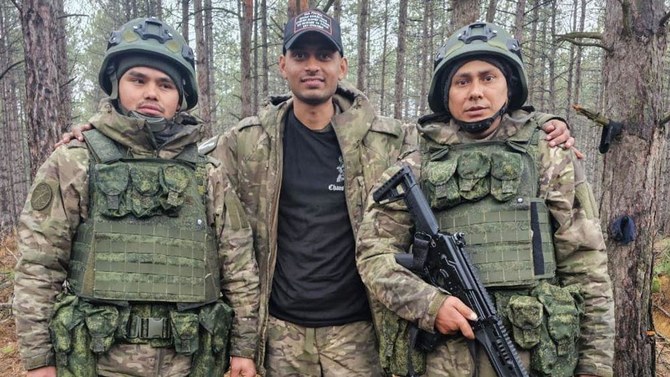
- Families of two Indian men who were killed in the war said that they had gone to Russia expecting to work as ‘helpers’ in the army
- At least 200 Nepalis are estimated to be serving in the Russian army and about 100 are missing
NEW DELHI: Indian police said four people linked to a network of human traffickers have been arrested on suspicion of luring young men to Russia with the promise of lucrative jobs or university places only to force them to fight in the war in Ukraine.
About 35 Indian men were duped in this manner, the Central Bureau of Investigation (CBI) said in March.
The four Indian nationals arrested were a translator, a person facilitating visa processing and the booking of airline tickets as well as two “main recruiters” for the southern states of Kerala and Tamil Nadu, the CBI said late on Tuesday.
The investigation “is continuing against other accused persons who are part of this international network of human traffickers,” the CBI said.
The families of two Indian men who were killed in the war have told Reuters they had gone to Russia expecting to work as “helpers” in the army.
India’s foreign ministry says each case has been “strongly taken up” with Russia. Moscow has not responded to repeated requests from Reuters for comment.
Other South Asian countries have also warned their citizens against such trafficking networks after multiple cases emerged of people being similarly duped into fighting in the Russian army.
Sri Lanka said on Wednesday that “a number” of its retired war veterans were lured to the Russia-Ukraine war front with the promise of a “handsome salary,” citizenship, and other benefits for serving in the army, none of which were granted.
“A significant number of war veterans have died and sustained injuries on the battlefield,” Sri Lanka’s Defense Ministry said, adding that the law would be “strictly enforced” in the matter.
A retired major and an employment agent have been arrested in this connection.
Nepal, which paused issuing work permits for Russia and Ukraine in January, has said several young unemployed Nepalis had been illegally recruited into the Russian army by agents who charged them hefty sums for visas.
At least 200 Nepalis are estimated to be serving in the Russian army and about 100 are missing, officials have said.
India has refused to condemn Russia over the war, calling instead for dialogue and diplomacy to end the conflict. The two countries have enjoyed a close relationship for decades, trading in items from fighter jets to tea.
India has also increased its purchase of cheap Russian oil since the war, with Moscow emerging as its top oil supplier in the last financial year for the second year in a row.


